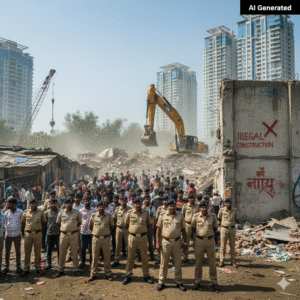For a long time, the Indian real estate market seemed to follow a predictable trajectory. From fiscal year 2021 to 2024, the market demonstrated a certain homogeneity. However, a recent report by international brokerage Nuvama suggests that this era might be over. The market is now showing distinct regional trends, with some cities still growing strong while others face new challenges. This shift means that investors and homebuyers must now look at the landscape with a more nuanced perspective. The future of the Indian real estate market will be defined by these regional variations, which are driven by unique economic and social factors.
Nuvama’s report provides a detailed breakdown of these trends. It suggests that the housing markets in Bengaluru and Chennai can continue their growth trajectory. These cities, often seen as tech hubs, benefit from a steady influx of talent and strong economic fundamentals. Their growth is a testament to their resilience and ongoing appeal. On the other hand, the brokerage believes that Hyderabad has likely peaked. This is a significant observation, as Hyderabad has been a real estate powerhouse for several years. The report indicates that the market’s rapid ascent may be slowing down, prompting a re-evaluation for those who have invested heavily in the city. The dynamic nature of the Indian real estate market means that today’s hotspot could be tomorrow’s plateau.
The report also sheds light on other major metropolitan areas. According to a brokerage note cited by ET Now, the Mumbai Metropolitan Region’s (MMR) housing market is currently at a “mid-cycle stage”. This suggests that it has more room for growth, but perhaps not at the breakneck speed seen in some other regions. Meanwhile, Pune has shown signs of “growth fatigue”. This is a warning to investors that the city’s market might be losing momentum. The report also singled out Gurugram. It stated that the city faces a significant “affordability challenge”. This is a crucial point for a city that has been at the forefront of luxury housing. As property prices soar, a growing segment of the population may find it difficult to afford homes, which could impact future sales volumes. This issue of affordability is a major headwind for the Indian real estate market.
Looking at the broader sector, Nuvama Institutional Equities said that real estate stocks may remain “range-bound” if cyclical stocks continue to be out of favor. This cautious outlook reflects a market sentiment that will likely remain subdued in the near term. The brokerage cited several challenges, including weak volume growth due to a fall in affordability, lower hiring because of tariff-related concerns, and a slow recovery in economic growth. These factors are creating an environment of uncertainty. Nuvama believes that volatility will continue. They suggest that stock prices will remain range-bound, with falling mortgage rates providing some downside protection, but valuation and volume growth concerns capping the upside. This cautious sentiment is a key characteristic of the current Indian real estate market.
Furthermore, Nuvama predicts that investor-led demand may decline as price increases are likely to moderate. This shift from investor-driven to end-user-driven demand can change market dynamics. End-users are typically more sensitive to price points and interest rates, which could lead to a more stable but less explosive growth pattern. Despite the cautious outlook, Nuvama has identified its top picks in the sector: Prestige Estates and Brigade Enterprises. The brokerage maintains a ‘Buy’ rating for both. They have a target price of Rs 2,009 per share for Prestige Estates, suggesting a potential upside of more than 21 percent. For Brigade Enterprises, they have a target price of Rs 1,437 per share, with an upside potential of nearly 51 percent. This indicates that even in a challenging environment, there are still opportunities for growth in the Indian real estate market.
In conclusion, the era of homogeneous growth in the Indian real estate market seems to be over. The Nuvama report paints a picture of a segmented market with distinct regional dynamics. While cities like Bengaluru and Chennai show resilience, Gurugram faces affordability issues, and Pune shows signs of growth fatigue. The cautious sentiment in the sector is a reflection of broader economic challenges. However, for discerning investors, there are still pockets of opportunity. The key is to move away from a one-size-fits-all approach and to analyze each market on its own merits. This detailed understanding will be crucial for navigating the evolving landscape of the Indian real estate market.
Source : MC












